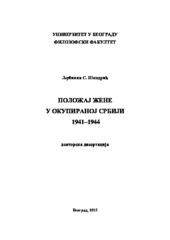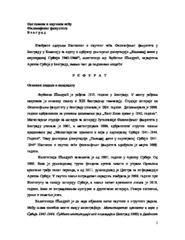Приказ основних података о дисертацији
Положај жене у окупираној Србији
Position of women in occupied Serbia: 1941-1945
| dc.contributor.advisor | Dimić, Ljubodrag | |
| dc.contributor.other | Radojević, Mira | |
| dc.contributor.other | Životić, Aleksandar | |
| dc.contributor.other | Pavlović, Momčilo | |
| dc.creator | Škodrić, Ljubinka S. | |
| dc.date.accessioned | 2016-04-16T15:12:14Z | |
| dc.date.available | 2016-04-16T15:12:14Z | |
| dc.date.available | 2020-07-03T10:01:26Z | |
| dc.date.issued | 2015-09-25 | |
| dc.identifier.uri | https://nardus.mpn.gov.rs/handle/123456789/5161 | |
| dc.identifier.uri | http://eteze.bg.ac.rs/application/showtheses?thesesId=2761 | |
| dc.identifier.uri | https://fedorabg.bg.ac.rs/fedora/get/o:10923/bdef:Content/download | |
| dc.identifier.uri | http://vbs.rs/scripts/cobiss?command=DISPLAY&base=70036&RID=526014615 | |
| dc.description.abstract | На основу архивске грађе, периодике, дневничких и мемоарских извора, као и домаће и стране литературе, у раду је анализиран друштвени положај жене током окупације Србије у Другом светском рату. Упркос напретку и побољшању друштвеног положаја, српска жена је до Другог светског рата остала друштвено и економски инфериорна у односу на мушкарца, а решавање женског питања ометао је и успон нацизма који се залагао за традиционалне женске улоге мајке и домаћице, али само за расно погодне жене. На окупираним територијама немачке власти су се ослањале на конзервативне снаге које су наглашавале патријархалне вредности, али су те вредности биле уздрмане и ступањем жена у интимне везе са немачким војницима. Насупрот женама које су сарађивале или биле блиске окупатору, велики број њих је страдао и доживео страшна логорска искуства. Поред политике окупационих власти, положај жене у окупираном друштву био је условљен и односом који су према њој имале колаборационистичке власти, али и покрети отпора. Колаборационистичке власти су однос према женама заснивале на ставовима које је пропагирао покрет „Збор“, негирајући потребу еманципације и инсистирајући на патријархалној подређености жене. Поред идеолошких притисака, животе жена је оптерећивала материјална оскудица, њихово школовање је ограничавано и усмеравано на то да постану добре мајке и домаћице, а са неповерењем је посматрана запослена жена и знатан број службеница је отпуштен. Женама је наметан императив брачности и мајчинства, на њих је падала одговорност за успех брака, док је међу најтежим женским улогама била улога мајке и старатељке над децом пошто је морала самостално да доноси одлуке о побачајима, напуштању деце или одвајању од њих. Равногорски покрет није улагао много напора у придобијање жена и наступао је са конзервативних, патријархалних становишта која су се мало разликовала од колаборационистичких, видећи жену искључиво као супругу и мајку. У својим најзначајнијим актима, покрет није разматрао питање давања политичких права женама, а није рачунао ни са великим доприносом жена својој војној организацији чији су припадници имали склоност ка агресивном исказивању мушкости. У раду женских равногорских организација које настају у последњој години окупације у почетку су пропагирани конзервативни ставови, да би након краткотрајног залагања за ангажовање жена у циљу еманципације, дошло до повратка на раније погледе. За разлику од колаборационистичких власти и равногорског покрета, комунистички покрет се залагао за позитивно решење женског питања. Иако је у предратном периоду дошло до повећања броја жена у партијском чланству, велики одзив и учешће жена у народноослободилачким одредима били су неочекивани и непланирани од стране комунистичког вођства. Мада је наглашавана потреба равноправности, у одредима су владали традиционални односи, али је сама могућност масовног учешћа жена у борби представљала преломни корак у односу на прошлост. Присуство жена у одредима је утицало да оне постану и омиљена мета противничке пропаганде, а поред тога, за њих су у одредима важили другачији стандарди, нарочито за преступе сексуалне дисциплине. Стварање антифашистичке организације жена имало је за циљ указивање помоћи одредима и политичко уздизање жена, али је овај рад спутаван и одвијао се успорено, да би окончањем окупације у највећој мери послужио изградњи нове власти. Након ослобођења су остварена обећања о стицању грађанских и политичких права, али је новостечена равноправност мало допринела нестајању патријархалних погледа на жену што је практичну примену једнакости учинило знатно сложенијом. | sr |
| dc.description.abstract | The thesis analyzes the social position of women during the occupation of Serbia in World War Two using archive material, periodicals, diary and memoir sources, as well as domestic and foreign literature. Despite the advancements and improvements made in the social position of women, the Serbian women remained socially and economically inferior to men up to the Second World War. The solution of the woman question was also hindered by the rise of Nazism that advocated traditional women’s roles of mother and housewife, but only for the racially suitable women. The German forces on the occupied territories relied on the conservative forces in the country that stressed patriarchal values, although these values were shaken by women having intimate relations with German soldiers. However, contrary to women who collaborated with the occupying forces and were intimate with them, a large number of women were killed or went through the horrendous experience of different kinds of camps. Apart from the policy conducted by the occupation authorities, the position of women in an occupied society was determined by the stand the collaboration authorities had towards them. The collaboration authorities in Serbia based their stand towards women on the one propagated by the “Zbor” movement, which meant denying the need for women’s emancipation and insisting on the patriarchal subordination of women. Besides the ideological pressures, women’s lives were burdened by poverty, their education was being limited and directed towards becoming good mothers and housewives, while the employed women were treated with suspicion and a large number of women clerks were dismissed from their jobs. The imperative of motherhood and marriage was imposed on women, they shouldered the responsibility for the success of a marriage, while the most difficult role was the one of motherhood and being guardian to the children because women alone had to decide on abortions, abandoning children or being separated from them. The Ravna Gora movement did not put much effort into attracting women and took the conservative, patriarchal stand that did not differ from the one of the collaboration authorities, as they both perceived women exclusively as wives and mothers. In the most important documents, the movement did not consider the issue of giving political rights to women, and did not count on the significant contribution of women to their military organization whose members had an inclination towards an aggressive expression of their masculinity. In the last year of the occupation, several women’s Ravna Gora organizations were formed advocating conservative stands in the beginning, briefly supporting the engagement of women whose aim was emancipatory and then returned to the initial stand. Contrary to the collaboration authorities and the Ravna Gora movement, the Communist movement advocated a positive attitude towards the woman question. Although the prewar period saw an increase in the number of women who joined the Communist Party, the number of women who responded to and took part in the National Liberation Army was unexpected and unplanned by the communist leadership. Despite stressing the need for equality among the sexes, traditional relationships prevailed in the military formations, but the very possibility of women taking massive part in the fighting represented a breakthrough in regards to the past. The presence of women in detachments resulted in them becoming the favorite target of enemy propaganda, and in addition, different standards applied to them, especially for violations of sexual discipline. Women’s antifascist organization was formed in order to assist the detachments and politically emancipate women, but this activity was obstructed and developed slowly. When the occupation ended these women’s organization greatly contributed to the strengthening the position of the new authorities. After the liberation of the country, the promise for full recognition of women’s political and civil rights was fulfilled, but the newly acquired equality did not contribute much to the disappearance of a patriarchal notion of women that made the exercising of equality greatly more complex. | en |
| dc.format | application/pdf | |
| dc.language | sr | |
| dc.publisher | Универзитет у Београду, Филозофски факултет | sr |
| dc.rights | openAccess | en |
| dc.rights.uri | https://creativecommons.org/licenses/by-nc-nd/4.0/ | |
| dc.source | Универзитет у Београду | sr |
| dc.subject | Србија | sr |
| dc.subject | Serbia | en |
| dc.subject | Други светски рат | sr |
| dc.subject | окупација | sr |
| dc.subject | колаборациja | sr |
| dc.subject | равногорски покрет | sr |
| dc.subject | народноослободилачки покрет | sr |
| dc.subject | жене | sr |
| dc.subject | еманципација | sr |
| dc.subject | женско питање | sr |
| dc.subject | World War II | en |
| dc.subject | occupation | en |
| dc.subject | collaboration | en |
| dc.subject | Ravna Gora movement | en |
| dc.subject | National liberation movement | en |
| dc.subject | women | en |
| dc.subject | emancipation | en |
| dc.subject | women question | en |
| dc.title | Положај жене у окупираној Србији | sr |
| dc.title | Position of women in occupied Serbia: 1941-1945 | en |
| dc.type | doctoralThesis | en |
| dc.rights.license | BY-NC-ND | |
| dcterms.abstract | Димић, Љубодраг; Радојевић, Мира; Павловић, Момчило; Животић, Aлександар; Шкодрић, Љубинка С.; Položaj žene u okupiranoj Srbiji; | |
| dc.identifier.fulltext | http://nardus.mpn.gov.rs/bitstream/id/26980/Skodric_Ljubinka_S.pdf | |
| dc.identifier.fulltext | http://nardus.mpn.gov.rs/bitstream/id/26979/Disertacija793.pdf | |
| dc.identifier.fulltext | https://nardus.mpn.gov.rs/bitstream/id/26979/Disertacija793.pdf | |
| dc.identifier.fulltext | https://nardus.mpn.gov.rs/bitstream/id/26980/Skodric_Ljubinka_S.pdf | |
| dc.identifier.rcub | https://hdl.handle.net/21.15107/rcub_nardus_5161 |



